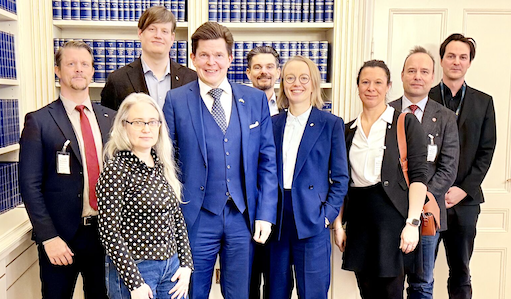Stefan Engblom’s personal web-page
I am…
…the Program chair of Applied Scientific Computing…
…the Director of eSSENCE…
…a SciLifeLab Group Leader…
…coordinating the TDB Seminar Series…
…the current faculty advisor of UPPSALA SIAM Chapter.
Find me at the Mathematics Genealogy Project.
Research
I am particularly interested in Scientific Computing in the intersection with Data-driven research and Data Science. I have extensive experiences in many aspects of Scientific Computing in general, in Numerical Modeling and -Analys in particular, as well as to some extent in High-Performance Computing. My main focus of applications are in the Biosciences at broad, but I’ve also taken an interest in traditional computational Engineering applications.
Current active research projects include Bayesian approaches for compute intensive data-driven models in epidemics, including in particular prediction, and multiscale modeling and parameterization of living cells, where spatial stochasticity is an important aspect of the modeling.
In case you are interested in doing a project work or a MSc-thesis, please feel invited to contact me for further discussions
Open project proposals:
Computational Epidemics driven by Data
In this line of research we are interested in the trade-offs between data and detailed so-called mechanistic models. The application focus is in epidemics and concerns modeling under uncertainties and supporting risk-based decisions. Part of the work will be done in URDME.
More details can be found here.
Computational cell population models: multiscale and multiphysics modeling
There are three suggested openings for projects within the software framework URDME. Suggestions include advanced new modeling, improving simulation efficiency and flexibility, as well as mathematical analysis.
More details can be found here.
Latest publications 2025
See also: my Google Scholar profile, or DiVA records for Author: Stefan Engblom. Alternatively, list of publications as a pdf.
- A. Nordman, S. Engblom, D. van der Spoel: Bayesian three-point water models
- In npj Comput. Mater. 11(366) (2025) (doi)
- E. Blom, S. Engblom: DLCM: a versatile multi-level solver for heterogeneous multicellular systems
- G. Menz, S. Engblom: Modelling Population-Level Hes1 Dynamics: Insights from a Multi-Framework Approach
- In Bull. Math. Biol 87(6):74 (2025) (doi).
- Read also the short BMB Article Highlight.
- Available via arXiv.
- Reproduce the numerical experiments using URDME.
- E. Blom, S. Engblom, G. Menz: Modeling the hallmarks of avascular tumors
Latest news and activities 2025
Nov 3: Start of the Project course in Computational Science. Welcome!
Oct 14–16: Swedish e-Science Academy in Umeå.
Sep 18–19: SciLifeLab group leader retreat.
Sep 1–5: Participated in the ENUMATH 2025 conference where I organized a minisymposium (MS82: The mathematics of pathology: quantitative methods) together with Fred Vermolen. I also gave a talk in the minisymposium MS20: Local and nonlocal transport in single and multiple scale heterogeneous processes.
Aug 27–28: At the Pandemic Laboratory Preparedness Network Meeting 2025.
Aug 20: Open position: Postdoc in Computational Epidemiology. Deadline to apply 31st of October 2025!
Aug 19–20: Visiting Advances in stochastic processes and numerical analysis.
May 26–28: Visit to Basel and to Mustafa Khammash to engage as the external advisor for the PhD defense of Elena D’Ambrosio. Congratulations!
May 5–6: I co-organized a DDLS-workshop entitled Infectious disease epidemiology: surveillance, forecasting and modelling together with Tove Fall, Tom Britton, and Laura Carroll. Read more in the DDLS post.
 Below photo: We had a memorable panel discussion too!
Below photo: We had a memorable panel discussion too! 
Apr 29: New preprint! We have been working with this one for some time now, happy to see it finalized: E. Blom, S. Engblom: DLCM: a versatile multi-level solver for heterogeneous multicellular systems, available via arXiv. The numerical experiments can be reproduced using URDME.
Apr: as of 1st of April I am the program chair of Applied Scientific Computing.
Mar 28: organized a half-day meeting with the eSSENCE graduate school.
Mar 17–18: TDB internal conference.
Mar 14: I gave a short talk in Upp-Upp, the internal conference for Statisticians in Uppsala.
Mar 13: visit to the Swedish parliament within the RIFO-program. Thanks a lot!

Jan 17: Gesina Menz presented her half-time seminar. External reviewer: Torbjörn Lundh.
Jan 14–16: participation in the BIT’65 conference.
Jan 10: poster presentation session in the Project course in Computational Science. Welcome!
Jan 8–9: final presentations in the Project course in Computational Science.
